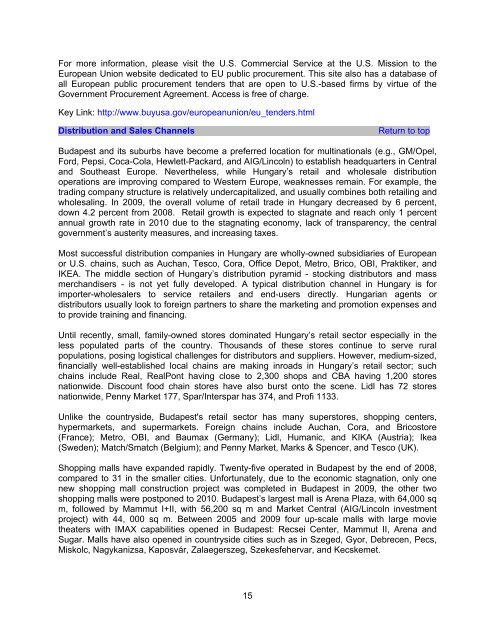Doing Business in Hungary 2010 - International Franchise Association
Doing Business in Hungary 2010 - International Franchise Association
Doing Business in Hungary 2010 - International Franchise Association
You also want an ePaper? Increase the reach of your titles
YUMPU automatically turns print PDFs into web optimized ePapers that Google loves.
For more <strong>in</strong>formation, please visit the U.S. Commercial Service at the U.S. Mission to the<br />
European Union website dedicated to EU public procurement. This site also has a database of<br />
all European public procurement tenders that are open to U.S.-based firms by virtue of the<br />
Government Procurement Agreement. Access is free of charge.<br />
Key L<strong>in</strong>k: http://www.buyusa.gov/europeanunion/eu_tenders.html<br />
Distribution and Sales Channels Return to top<br />
Budapest and its suburbs have become a preferred location for mult<strong>in</strong>ationals (e.g., GM/Opel,<br />
Ford, Pepsi, Coca-Cola, Hewlett-Packard, and AIG/L<strong>in</strong>coln) to establish headquarters <strong>in</strong> Central<br />
and Southeast Europe. Nevertheless, while <strong>Hungary</strong>’s retail and wholesale distribution<br />
operations are improv<strong>in</strong>g compared to Western Europe, weaknesses rema<strong>in</strong>. For example, the<br />
trad<strong>in</strong>g company structure is relatively undercapitalized, and usually comb<strong>in</strong>es both retail<strong>in</strong>g and<br />
wholesal<strong>in</strong>g. In 2009, the overall volume of retail trade <strong>in</strong> <strong>Hungary</strong> decreased by 6 percent,<br />
down 4.2 percent from 2008. Retail growth is expected to stagnate and reach only 1 percent<br />
annual growth rate <strong>in</strong> <strong>2010</strong> due to the stagnat<strong>in</strong>g economy, lack of transparency, the central<br />
government’s austerity measures, and <strong>in</strong>creas<strong>in</strong>g taxes.<br />
Most successful distribution companies <strong>in</strong> <strong>Hungary</strong> are wholly-owned subsidiaries of European<br />
or U.S. cha<strong>in</strong>s, such as Auchan, Tesco, Cora, Office Depot, Metro, Brico, OBI, Praktiker, and<br />
IKEA. The middle section of <strong>Hungary</strong>’s distribution pyramid - stock<strong>in</strong>g distributors and mass<br />
merchandisers - is not yet fully developed. A typical distribution channel <strong>in</strong> <strong>Hungary</strong> is for<br />
importer-wholesalers to service retailers and end-users directly. Hungarian agents or<br />
distributors usually look to foreign partners to share the market<strong>in</strong>g and promotion expenses and<br />
to provide tra<strong>in</strong><strong>in</strong>g and f<strong>in</strong>anc<strong>in</strong>g.<br />
Until recently, small, family-owned stores dom<strong>in</strong>ated <strong>Hungary</strong>’s retail sector especially <strong>in</strong> the<br />
less populated parts of the country. Thousands of these stores cont<strong>in</strong>ue to serve rural<br />
populations, pos<strong>in</strong>g logistical challenges for distributors and suppliers. However, medium-sized,<br />
f<strong>in</strong>ancially well-established local cha<strong>in</strong>s are mak<strong>in</strong>g <strong>in</strong>roads <strong>in</strong> <strong>Hungary</strong>’s retail sector; such<br />
cha<strong>in</strong>s <strong>in</strong>clude Real, RealPont hav<strong>in</strong>g close to 2,300 shops and CBA hav<strong>in</strong>g 1,200 stores<br />
nationwide. Discount food cha<strong>in</strong> stores have also burst onto the scene. Lidl has 72 stores<br />
nationwide, Penny Market 177, Spar/Interspar has 374, and Profi 1133.<br />
Unlike the countryside, Budapest's retail sector has many superstores, shopp<strong>in</strong>g centers,<br />
hypermarkets, and supermarkets. Foreign cha<strong>in</strong>s <strong>in</strong>clude Auchan, Cora, and Bricostore<br />
(France); Metro, OBI, and Baumax (Germany); Lidl, Humanic, and KIKA (Austria); Ikea<br />
(Sweden); Match/Smatch (Belgium); and Penny Market, Marks & Spencer, and Tesco (UK).<br />
Shopp<strong>in</strong>g malls have expanded rapidly. Twenty-five operated <strong>in</strong> Budapest by the end of 2008,<br />
compared to 31 <strong>in</strong> the smaller cities. Unfortunately, due to the economic stagnation, only one<br />
new shopp<strong>in</strong>g mall construction project was completed <strong>in</strong> Budapest <strong>in</strong> 2009, the other two<br />
shopp<strong>in</strong>g malls were postponed to <strong>2010</strong>. Budapest’s largest mall is Arena Plaza, with 64,000 sq<br />
m, followed by Mammut I+II, with 56,200 sq m and Market Central (AIG/L<strong>in</strong>coln <strong>in</strong>vestment<br />
project) with 44, 000 sq m. Between 2005 and 2009 four up-scale malls with large movie<br />
theaters with IMAX capabilities opened <strong>in</strong> Budapest: Recsei Center, Mammut II, Arena and<br />
Sugar. Malls have also opened <strong>in</strong> countryside cities such as <strong>in</strong> Szeged, Gyor, Debrecen, Pecs,<br />
Miskolc, Nagykanizsa, Kaposvár, Zalaegerszeg, Szekesfehervar, and Kecskemet.<br />
15
















